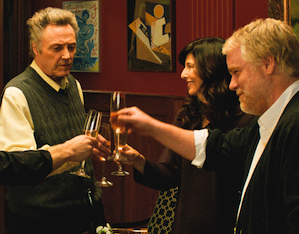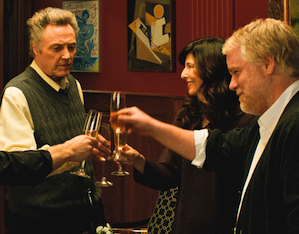
Early on in A Late Quartet, director Yaron Zilberman’s fervent and disjunctive new film about a string quartet coming apart at the seams as the members prepare for a performance of Beethoven’s Op. 131, the cellist (played by Christopher Walken) muses on the piece’s meaning and technical hurdles. He quotes T.S. Eliot on the nature of time and talks about the instruments going out of tune over the course of seven movements played attacca (without pause). Finally, Walken’s character concludes, “It’s a mess.”
The same might be said of the plot’s melodramatic heaving and shuddering. Sexual intrigues and betrayals, present and past, pile up like so many notes crowded onto an overwritten score. Some of the narrative complications and entire stretches of the dialogue are obvious or implausible. The climactic scene, set at a performance of the Beethoven quartet, is sentimentally contrived.
Related Article
Imogen Poots on Beethoven: Live From the Red Carpet
But never mind the wobbly melodies and sour notes. This superbly acted Quartet succeeds in ways that many films about music — or other forms of artistic creation, for that matter — do not. In its portrayal of the labor, emotional dynamics, ego, self-effacement, and intimacy of a chamber ensemble, the movie strikes some powerful and supple chords. Beethoven’s angular and tender late work is not only the musical premise but also the discipline and divining spirit for these wayward characters as they try, fail, and try again to do justice to a masterpiece.
The first crisis for the so-called Fugue Quartet arises when Walken’s character, Peter, learns that he has early-stage Parkinson’s disease and announces his intention to retire. Meanwhile the marriage of the second violinist, Robert (Philip Seymour Hoffman), and the violist, Juliette (Catherine Keener), is veering off its well-worn tracks. Tensions ramp up when their daughter, Alexandra (Imogen Poots), an aspiring if ambivalent violinist, sleeps with the first violinist, Daniel (Mark Ivanir), who is also her teacher.
A steamy flamenco dancer (Liraz Charhi) heats up the action. Fists fly and furniture splinters at one point. Alexandra and Daniel’s first full-on love scene turns into a Feydeau-ish farce when Juliette, who herself once had an affair with Daniel, turns up at her daughter’s apartment. The mezzo-soprano Anne Sofie von Otter materializes in a dreamlike flashback.
This superbly acted Quartet succeeds in ways that many films about music … do not.
When the static clears and A Late Quartet zeros in on music, the film often becomes richly expressive, by turns delicate, blunt, and penetrating. Shots of Daniel working on his bows, gently bending them over a flame or stringing them with just the right kind of horse hair, quietly celebrate a musician’s fine-tuned connection to his instrument. Close-ups of Peter’s tremulous vibrato take on a poignant resonance as the cellist’s body begins to betray him.
Second-Fiddle Syndrome
In a move that seems at once craven and emotionally clear, Robert seizes on Peter’s illness as an occasion to voice his own discontent about always playing second violin in the quartet. “Your timing couldn’t be worse,” his steely rival Daniel righteously responds. But it’s precisely the opportunistic timing that makes this human dissonance so telling and true. A musician, like music itself, can be pitiless as well as sublime, self-absorbed as well as selfless.
Alexandra uses the sulky, rebellious meter of her own line deliveries to both manage and manipulate the pressures of growing up in a musical family. Comparing her father to her teacher, she tells Daniel, “He could teach you to be a little. Less. Anal.” It’s a scene full of overtones, from the adolescent to the impish to the desperately sexual.
How much of a great performance is technical mastery … and how much is spontaneous inspiration?
There’s a fascinating through-line in the film about whether the quartet should perform the Beethoven from memory rather than depend so closely on their markings in the score. When Peter tells Daniel that he practices too much, he’s raising a deeper issue. How much of a great performance is technical mastery, A Late Quartet asks in various ways, and how much is spontaneous inspiration? Peter echoes the question when he tells his string quartet students about several surprising encounters he had, first as a student and later as a colleague, with Pablo Casals. Music lovers will seize on such moments and replay them later in their heads.
Persuasive as they are at handling their instruments, this excellent ensemble cast transcends acting technique to explore the deep human dimension of what it means to make music together. As the players push and pull with each other, struggling to speak as one in the eloquent language that has no words, A Late Quartet fuses the art of great acting to the anguish and aspiration of the characters’ musical lives.

